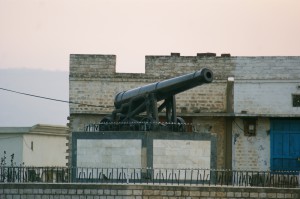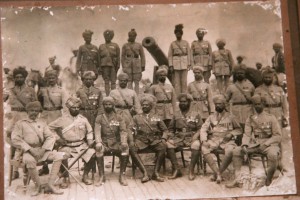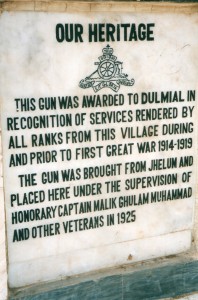
A nineteenth century cannon sits at the entrance of a Pakistani village. Michael Noble takes a look at the story of the Dulmial Gun.
Dulmial is a village approximately a hundred miles south of Islamabad in Pakistan. A century ago, the area was part of British India, which meant that its inhabitants were drawn into the Great War on the side of the Allies. A settlement steeped in military history, Dulmial sent 460 of its men to fight in the British Army, the largest single participation of any village in Asia. Nine gave their lives. In recognition of this service and sacrifice, in 1925 the British government offered Dulmial an award of their choosing.
The man in charge of this choosing was Captain Ghulam Mohammad Malik, the highest ranking and most decorated soldier in the village. The Captain was a man of great experience, having commenced his military life in the Derajat Mountain Battery and participated in Lord Roberts’ march from Kabul to Kandahar in 1880. A career soldier, he eschewed the British offers of land, money and water facilities, choosing instead to have Dulmial’s contribution recognised with the presentation of a cannon.

The British agreed to this selection and provided Dulmial with a twelve pounder. Agreeing was the easy part. Getting the thing to Dulmial would be quite a different matter. The gun was to be collected from the First Punjab Regimental Centre in Jhelum, from where it could be carried by train to Chakwal. There, the gun was dismounted and loaded in a cart to be pulled by three pairs of oxen for the remaining 28 kilometres. The roads were semi-mountainous and passage was difficult. It would take the ox carts two weeks to cover the distances. From five kilometres out, at Choa Saiden Shah, the route became more difficult still and Dulmial had to despatch five additional pairs of oxen to relieve the initial six and complete the gun’s journey.
Safely in Dulmial, the gun was placed at the main entrance to the village and a photograph taken with the local commissioned officers. It remains there today, a reminder of the contribution that Dulmial made in the First World War.

Dulmial is now known within Pakistan as the ‘village with the gun’, but it is rather less well known in the UK. ‘This is because very little has been written or published about the the village in English’, says Dr Irfan Malik, a Nottingham man whose family originates in Dulmial. ‘I have visited Dulmial many times over the years’, he continues ‘and I have made it my aim to research the World War One history of the village as it played such an impressive part during the time’. It is Irfan’s intention to bring this hidden history to a wider audience and help to share the reasons of just what a nineteenth century Scottish cannon is doing in the mountains of Pakistan.